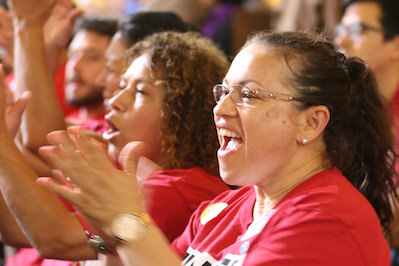Truthdiggers of the Week: The Workers Who Won $15 an Hour in Los Angeles
The pay raise will benefit government and the city’s economy as a whole, researchers say. Those who rallied for this important change have helped many others while helping themselves.

Workers react as the Los Angeles City Council votes to raise the minimum wage in the city to $15 an hour. (AP / Damian Dovarganes)
Every week the Truthdig editorial staff selects a Truthdigger of the Week, a group or person worthy of recognition for speaking truth to power, breaking the story or blowing the whistle. It is not a lifetime achievement award. Rather, we’re looking for newsmakers whose actions in a given week are worth celebrating.
The City Council of Los Angeles—one of the most unaffordable city in America—voted 14 to 1 Tuesday in favor of legislation that will raise the minimum wage to $15 an hour from about $9 over the next five years. The raise will be a boon to workers who struggle to live in a city where an income of $33 an hour is required to afford the average apartment. As a result of the City Council action, 609,000 workers—or 41 percent of the workforce—are expected to receive a raise by 2019. Eighty percent of those affected will be people of color.
Businesses and governments are expected to benefit too. A pro-labor report (which was blessed by independent researchers at UC Berkeley) said the raise will be good for Los Angeles’ economy. Raising the wage will put an extra $5.9 billion into the pockets of workers over the next four years, each dollar generating a stimulus of $1.12. About 46,000 new jobs will be created across the Los Angeles region, more than half of them inside the city. State and local governments will get an additional $414 million in tax revenue, and the federal government will receive an extra $546 million. Money spent by the city to support people who don’t earn enough to support themselves will drop by an estimated $313 million.
Whom should the public thank for these gains? The public campaign was led by LA Raise the Wage, a group that bills itself as a “coalition of business, labor and community leaders.” Its base is made up of thousands of workers whose contributions ranged from signing pledges to leading rallies. The organization spotlighted a number of those workers on its website.
Daniel Cotes spent 21 years working at Wal-Mart before his pay rose to $15 an hour. At a campaign event held in solidarity with fast-food workers, he said: “It’s important to raise the wage so people can provide for their families—meals, emergency things and to have fun.”
Shirley Watson went back to college when her job in the aerospace industry was terminated after 22 years. But then, after receiving a master’s degree, she was making only $9.65 an hour. “The rent is what wipes us out,” the campaign quotes her as saying. “In such a wealthy city, to see so many people without. … It just seems like there’s two groups: the haves and the have-nots.” Watson is among the 36 percent of low-wage workers in Los Angeles who have a bachelor’s or graduate degree. Her struggle gives the lie to the notion that education is a sure way to prosperity.
A single mother, Zenaida Torres depends on tips to support herself and her daughter. “The restaurant I work at keeps raising their prices,” she said. “I’ve been making the same minimum wage. … They [the business owners] keep on making more money and we stay where we are.” Torres’ situation exemplifies another problem that wage workers face. After settling a complaint of wage theft—the illegal withholding of wages or the denial of benefits rightfully owned to an employee—her boss cut her hours. This shows the need for strong provisions for labor-law enforcement in the legislation that ultimately leaves the mayor’s desk.
The struggle for higher wages is ancient and in no small way sacred. It is responsible for bringing about the unprecedented quality of life that became the standard of many Western societies in the latter half of the 20th century. As a host of changes threatens to reverse this progress—including deliberate acts from businesses and the legislators they lobby—a future in which large numbers among our growing population have the opportunity to enjoy a high quality of life becomes increasingly difficult to imagine. Workers agitating for their due are thus frontline fighters for the ensured well-being of the vast majority of us. For making progress happen in Los Angeles, we honor those involved in the campaign for $15 an hour as our Truthdiggers of the Week.
Independent journalism is under threat and overshadowed by heavily funded mainstream media.
You can help level the playing field. Become a member.
Your tax-deductible contribution keeps us digging beneath the headlines to give you thought-provoking, investigative reporting and analysis that unearths what's really happening- without compromise.
Give today to support our courageous, independent journalists.





You need to be a supporter to comment.
There are currently no responses to this article.
Be the first to respond.